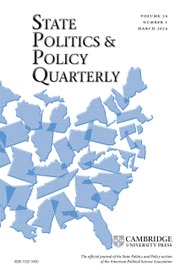Article contents
Policy Feedback and the Polarization of Interest Groups
Published online by Cambridge University Press: 08 November 2021
Abstract
We use the case of education interest groups to examine how and when policy changes lead interest groups to polarize in their support for political parties. Using over 145,000 campaign contributions from all 50 states from 2000 to 2017, we test whether the passage of private school choice, charter laws, and labor retrenchment policies led to the polarization of education interest groups over time. In 2000, teachers unions were the dominant group and mostly aligned with Democrats. Meanwhile, Republicans lacked support from any education groups. This pattern was consistent across states. Over time, coalitions in some states became polarized, meaning unions grew even more aligned with Democrats and reform groups with Republicans, while other states did not experience such polarization. We show that private school choice programs, but not labor retrenchment or charter laws, contributed to this changing partisan alignment. Our findings demonstrate that policy feedback can shape both the electoral mobilization and party alignments of interest groups.
Keywords
- Type
- Original Article
- Information
- Copyright
- © The Author(s), 2021. Published by Cambridge University Press on behalf of the American Political Science Association
References
- 9
- Cited by


